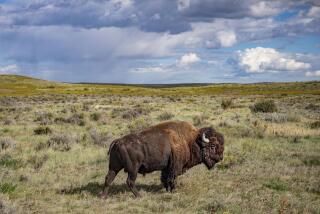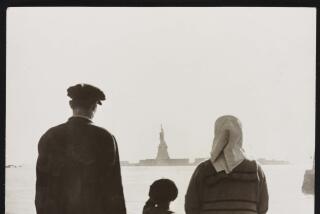Television review: ‘Into the Deep: America, Whaling & the World’
- Share via
Ric Burns, the Burns who isn’t Ken but whose work — including “The Way West” and “New York: A Documentary Film” — is very much of a piece with that of his better-known brother, has a new film, “Into the Deep: America, Whaling & the World,” premiering Monday as part of the PBS series “The American Experience.”
In the house style, established back in 1990 by Ken’s “The Civil War,” which Ric co-produced and co-wrote, it is ambitious, embracing the metaphors as well as the facts. Like all of the brothers’ films, it balances dry readings of personal testimony with the more enthusiastic re-creations of scholarly talking heads; is very pretty to look at, in a way that can obscure the violence of the tale; and is exceedingly slow and elegiac, as if sad that the past was no longer with us. (Really, the Burns’ whole careers might be seen as an attempt to defy that fact.)
It is, also, like all their works, about America, as practice and as idea. Burns’ subject here is not the whole of whaling, as it began and exists now, but only as it advanced in, and advanced the fortunes of, this nation. Although it jumps around in time a bit — Burns pegs much of the story on the ill-fated 1820 voyage of the Essex, twice-rammed and sunk by a sperm whale, and the novel it inspired, Herman Melville’s 1851 “Moby-Dick — the film essentially begins with the Colonial practice of harvesting beached whales and ends, but for a shot or two of modern whaling, in the early 1920s, when the American whaling industry, in slow decline since the 1859 discovery of petroleum in western Pennsylvania, breathed its last.
Between those poles comes the story of an industry — the oil business of its day — that helped make America a world power. (“No sea but what is vexed by their fishing,” said Anglo-Irish statesman Edmund Burke on the eve of the American Revolution.) It was not only that the whale oil itself lubricated the machines that made the Industrial Revolution revolve, but that the whaling money that filled the banks of New England financed the railroads and the westward expansion: The process of exploration, domination and decimation that whaling embodied reflected the greater story of American ambition.
In a larger sense, whaling — which began as a community-based, communally held enterprise and wound up as a capitalistic system of floating factories that got the most out of an expendable workforce for as little as possible — stands for every form of industry that destroys the resource upon which it’s based. As the coasts and nearer waters were fished out, whalers had to go farther, voyages that had lasted weeks or months came to last years. Melville, who spent three years at sea himself, wondered “whether Leviathan can long endure so wide a chase, and so remorseless a havoc,” and although much of the world has ended that chase, it is not over, and that question is not closed.
That we are done with whaling here is precisely because in the American economy whales are no longer, in the words of one commentator, “floating profit centers to be taken advantage of, not preserved”; indeed, we love them now, we rescue them. Burns ends his film with images to illustrate Melville’s lovely evocation of a whale nursery, the calves “looking up towards us, but not at us, as if we were but a bit of gulf-weed in their newborn sight.” It is marvelous and, for this still-perilous moment, heartbreaking.
More to Read
The complete guide to home viewing
Get Screen Gab for everything about the TV shows and streaming movies everyone’s talking about.
You may occasionally receive promotional content from the Los Angeles Times.







